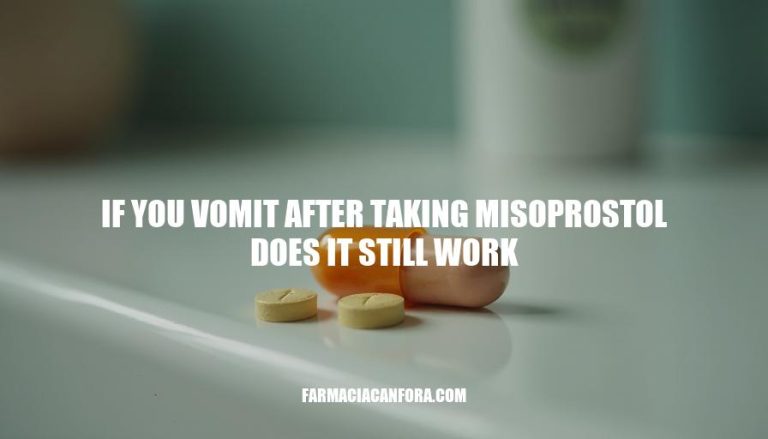


Misoprostol is a medicine that helps with stomach problems, like ulcers. It can also help with labor and heavy bleeding after childbirth. Some people use it to end a pregnancy, which causes cramps and bleeding.
If you throw up after taking misoprostol, it might not work as well.
So, make sure to follow the instructions from your doctor carefully.
Does this help you understand things better?
Misoprostol is a synthetic prostaglandin E1 analogue that works by causing the uterus to contract and the cervix to soften, leading to the expulsion of the contents of the uterus. It is often used for medical abortions, inducing labor, and treating postpartum hemorrhage.
Absorption is crucial for misoprostol’s efficacy. When taken orally, misoprostol is rapidly and almost completely absorbed from the gastrointestinal tract.
However, if you vomit shortly after taking misoprostol, it may not be fully absorbed, which can reduce its effectiveness. If vomiting occurs within 30 minutes of taking the pill, it is recommended to repeat the dose.
In summary, proper absorption is essential for misoprostol to work effectively, and vomiting shortly after taking it can impact its efficacy.
If you vomit after taking misoprostol, it can impact its absorption and efficacy. If vomiting occurs within 30 minutes of placing the tablets under your tongue or between your gums and cheek, the medication may not be fully absorbed, and you might need to repeat the dose. However, if vomiting happens after the 30-minute period, the medication has likely already been absorbed, and repeating the dose may not be necessary.
If you vomit after taking misoprostol, the next steps depend on when the vomiting occurs:
If you vomit within 30 minutes of placing the tablets under your tongue or between your gums and cheek: The tablets may not have had enough time to be absorbed. In this case, you should take another dose immediately.
If you vomit after the tablets have been under your tongue or between your gums and cheek for 30 minutes: The tablets are likely already absorbed, and you do not need to take another dose.
Consult a healthcare professional: If you are unsure or if vomiting persists, it is important to seek medical advice to ensure the medication is effective and to address any concerns.
Manage side effects: If you experience nausea, consider taking an anti-nausea medication before taking misoprostol to help prevent vomiting.
Stay hydrated: Vomiting can lead to dehydration, so make sure to drink plenty of fluids.
Follow the prescribed dosage schedule: Take subsequent doses as directed, even if you vomit after taking them, unless advised otherwise by a healthcare professional.
Remember, it’s always best to consult with a healthcare provider for personalized advice and guidance.
If you vomit after taking misoprostol, its effectiveness may be reduced if vomiting occurs within 30 minutes of taking the pill.
However, if vomiting happens after the 30-minute period, the medication has likely already been absorbed, and repeating the dose may not be necessary.
To ensure proper absorption and efficacy, it is crucial to follow the instructions from your doctor carefully and take subsequent doses as directed.
If you are unsure or experience persistent vomiting, consult a healthcare professional for personalized advice and guidance.